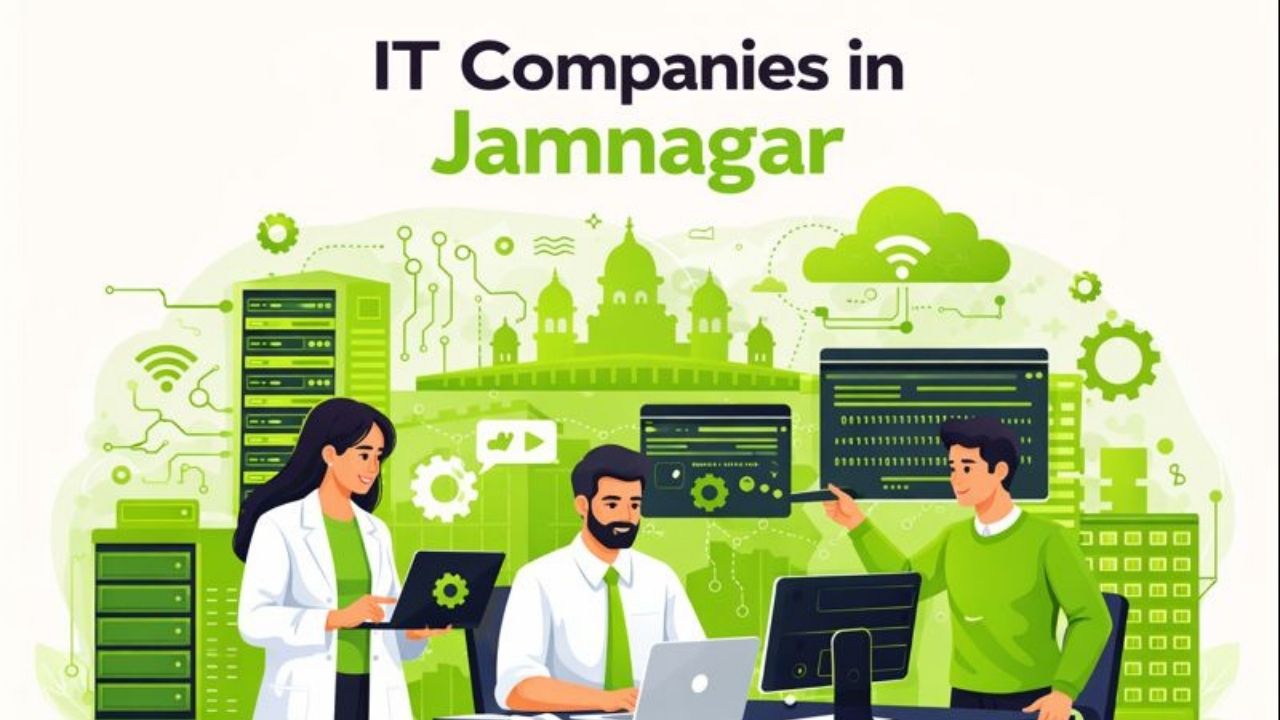Time management is one of the major factors in business in the modern busy world because of the importance attached to it to organizational profitability and personal performance. The most appropriate time tracking tool is an effective resource that helps companies track, analyze, and optimize their time consumption across various projects and activities. As remote work is becoming more and more common, and the complexity of projects increases, companies require powerful solutions that should be able to collect time data fast and efficient, as well as it should be able to bring valuable information to support the decision-making process.
Time tracking software has come a long way since the old clock-in and clock-out programs, to include fully featured packages that interact with marketing project management systems, payroll systems, and can perform billing. Such intelligent tools assist organizations in familiarizing themselves with resource distribution, increasing profitability within projects, and establishing overall optimization of operations.
Be it a freelancer that needs to keep several clients in mind, a small business owner concerned with measuring the productivity of people working, or a major business conglomerate that has a complex project to coordinate, the choice of a proper time tracking system can prove to be make or break a make-or-break dent on your bottom line and operational efficiency.
What is Time Tracking Software?
Time tracking software is an online application that helps individuals and companies track the time spent on various tasks, projects, and activities. These applications document hours worked, perform detailed reporting, and give insight into the patterns of productivity automatically or manually. The most common features of the Best Time Tracking Software are project categorization, team collaboration, invoicing, and connection with other business software.
With the applications, organizations have the opportunity to manage projects more proficiently, be more accurate in terms of issuing bills and allocating resources, and therefore have increased productivity. There are popular tools as solutions that are used by freelancers, remote departments, and large companies, and all of them provide adjustable functions to address specific task requirements and business needs.
Why Time Tracking Software is Important
Time tracking software has become a tool that can not be ignored by businesses that require optimization of their productivity, improvement of project management, and a satisfactory competitive edge in the dynamic marketplace today.
- Productivity: Improves the efficiency of employees by giving them a picture of how they are spending their time and where they can better it in various tasks.
- Billing: Billing clients and inaccurate invoicing of clients on professional services is taken care of through recording accurate time spent on definite projects and deliverables.
- Compliance: Ensures regulatory compliance through recording the hours of work and activities to be used towards legal reporting, financial, and industry reporting.
- Analytics: provides advanced analytics in terms of the performance of a team, the profitability of a project, and the utilization of resources in terms of reporting and data visualisation.
- Accountability: Instills strong structures of accountability through monitoring of individual contributions and facilitating open scrutiny of performance in the entire organization or departments.
Essential Features to Look for in the Best Time Tracking Software
Companies should look at time tracking features when deciding, since they need features that will suit their needs in terms of operation, and also their future developments and growth.
- Automation: It minimizes manual data entry with the help of smart tracking mechanisms, which record work movements without frequent interference by the user or their supervision.
- Integration: Interests with other business systems such as project management systems, accounting software, and human resource management tools.
- Reporting: Offers detailed analytics and configurable reports that provide actionable information to the management to make crucial decisions and plan strategically.
- Mobility: Provides cross-platform access to mobile applications and web interfaces that allow checking time from any location and any device.
- Customization: Provides the flexibility to configure flexibility in tracking parameters, categories, and workflows to fit particular processes and needs in the organization.
Comparison Table for Best Time Tracking Software
| Software | Rating | Best Feature |
| Productive | 4.8/5 | Real-time profitability insights |
| Kantata | 4.7/5 | Resource management features |
| monday.com | 4.6/5 | Project time tracking |
| Replicon | 4.6/5 | Intelligent time tracking |
| Hubstaff | 4.5/5 | Distributed team management |
| Accelo | 4.4/5 | Integrated project management |
| Insightful | 4.3/5 | Remote team monitoring |
| Deel | 4.2/5 | Payroll synchronization |
| Resource Guru | 4.1/5 | Timesheet logging |
| Ravetree | 4.0/5 | Expense tracking integration |
Top 10 Best Time Tracking Software
1. Productive
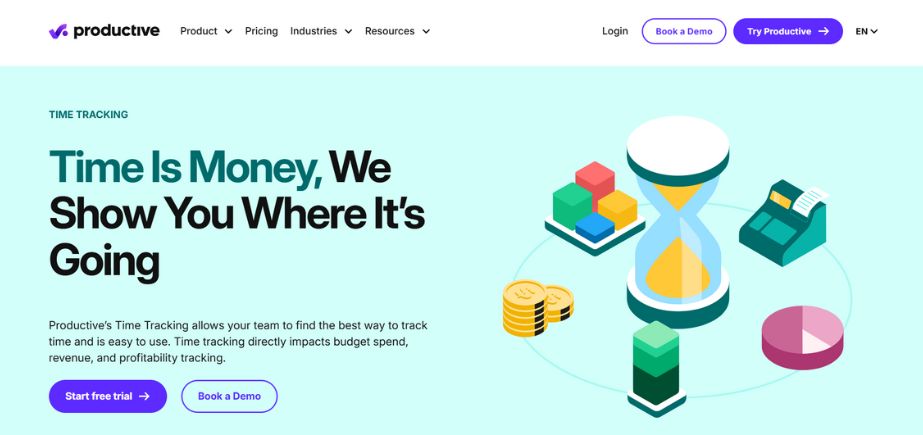
Rating: 4.8/5
Website: https://productive.io/
Best Use Cases: Agencies seeking real-time project profitability tracking and resource optimization
Productive is a powerful application that was created to manage the work and the finances of creative agencies and professional services firms. It integrates real-time tracking, project, resource allocation, and management, and financial reporting to offer an end-to-end business management environment. Its profitability in real-time feature assists an organization in making informed decisions on the pricing of projects, distribution of resources, and relationships with clients.
The software is advantageous in offering visibility of team use, project margins, and business-wide performance across intuitive dashboards and capable reporting functionalities. The strong point of productive is that it perfectly interrelates the time tracking data with the rest of the business performance level, allowing their leaders to know the actual cost and profitability of their businesses and retain a high rate of team efficiency and client satisfaction.
Key Features
- Real-time profitability tracking
- Resource capacity planning
- Budget management tools
- Team collaboration features
- Custom reporting dashboards
Pros
- Intuitive user interface
- Comprehensive business insights
- Excellent customer support
Cons
- Higher pricing tier
- Complex initial setup
- Limited integration options
Pricing: From $11/month per user (billed annually)
2. Kantata
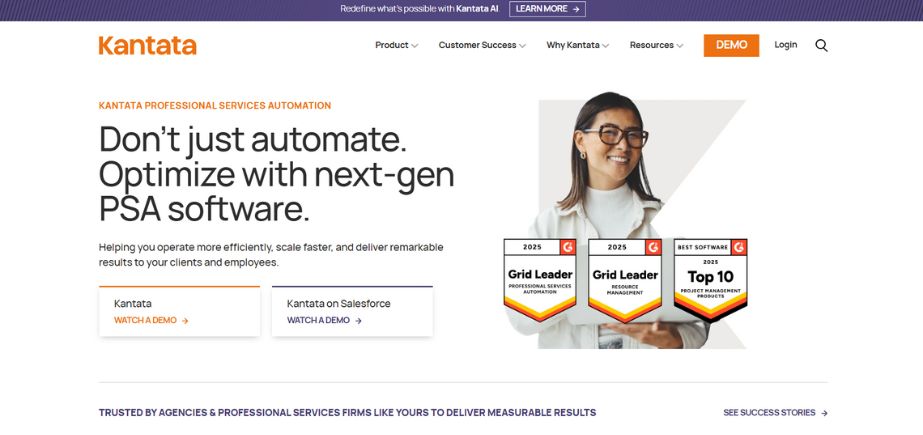
Rating: 4.7/5
Website: https://www.kantata.com/
Best Use Cases: Professional services firms requiring advanced resource management and project optimization
Kantata is a solid platform that not only handles time tracking but also has advanced resource management functions; thus, it is suitable within professional service firms with complicated projects and handling of numerous clients. The software offers in-depth information on resource management, project performance, and business operations by using extensive analytics and reporting capabilities. It is also powerful in assisting organizations to distribute resources better, deliver projects more efficiently, and become more efficient in general.
Its advanced forecasting features translate to improved planning and decision-making, and a combination of Kantata with finance-related systems will make sure that billing and profitability calculations are dead accurate. The platform is also of great use to consulting firms, marketing, and technology service providers that must juggle a variety of projects and maintain high levels of utilization and client satisfaction at the same time.
Key Features
- Advanced resource planning
- Project performance analytics
- Financial management integration
- Capacity forecasting tools
- Client portal access
Pros
- Comprehensive feature set
- Strong analytics capabilities
- Excellent resource optimization
Cons
- Steep learning curve
- Premium pricing model
- Complex configuration requirements
Pricing: $59/user/month
3. monday.com
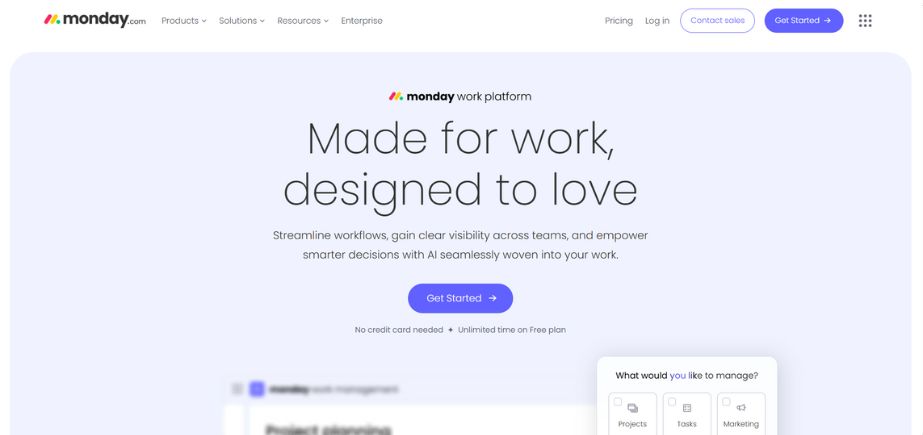
Rating: 4.6/5
Website: https://monday.com/
Best Use Cases: Teams needing integrated project management with time tracking capabilities
Monday.com is an agile solution that combines time tracking features with project management perfectly, so it is a great choice of solution when a time-tracking tool is in demand along with project management. Visual approach to project management and solid time tracking capabilities made the software a good addition to teams to keep them organized, but also ensure they are keeping proper records of time spent on different tasks and projects they are working on.
The fact that it is customizable in terms of the workflow and automation of the processes proves to cut down on administrative overhead; however, it also makes sure that time tracking can be an inherent part of the project management process. The collaboration functions of the platform improve the communication and coordination of teams and, at the same time, ensure transparency of hours spent on a project and the project’s progress.
Key Features
- Visual project management
- Customizable workflow automation
- Team collaboration tools
- Integration marketplace
- Mobile accessibility
Pros
- User-friendly interface
- Flexible customization options
- Strong integration ecosystem
Cons
- Can become expensive
- Limited advanced reporting
- Overwhelming feature set
Pricing: From $8/user/month (billed annually)
4. Replicon
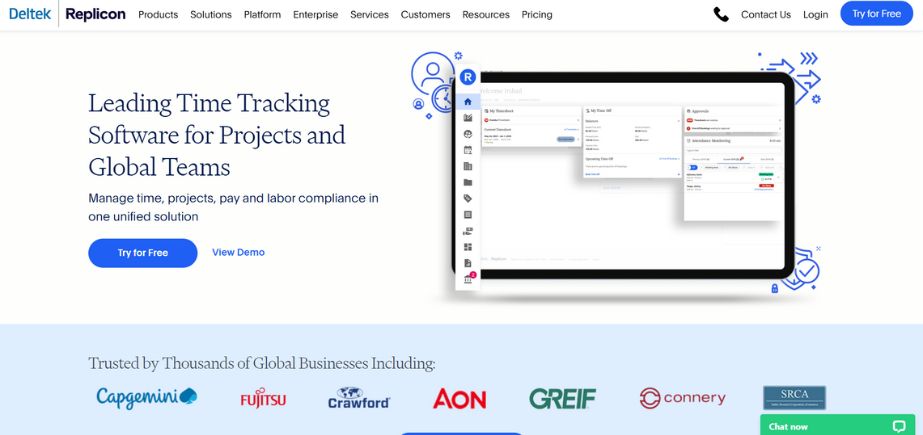
Rating: 4.6/5
Website: https://www.replicon.com/
Best Use Cases: Organizations requiring intelligent automated time tracking with minimal user intervention
The artificial intelligence helps Replicon deliver smart time tracking that helps minimize the input of data manually; at the same time, it enhances accuracy and compliance. The benefits of the platform include AI-based functionality able to automatically recognize work activity, offer time entries, and provide regular coverage throughout applications and projects. Such a smart decision saves employees jobs of excessive administrative work and gives a manager all the correct and complete time information.
The advantage of Replicon is the fact that it easily fits different work patterns and automatically groups activities using historical data and sets of rules. The platform is especially useful and beneficial in case the organization has a complicated pattern of billing, numerous clients, or significant compliance demands. The strength of its reporting and analytics capabilities gives these a good insight into productivity trends, the performance of the particular projects, and the use of resources within the organisation.
Key Features
- AI-powered time capture
- Automated project categorization
- Compliance management tools
- Advanced analytics platform
- Mobile time tracking
Pros
- Intelligent automation features
- Comprehensive compliance support
- Detailed analytics capabilities
Cons
- Complex setup process
- Higher learning curve
- Premium pricing structure
Pricing: From $29/user/month
5. Hubstaff
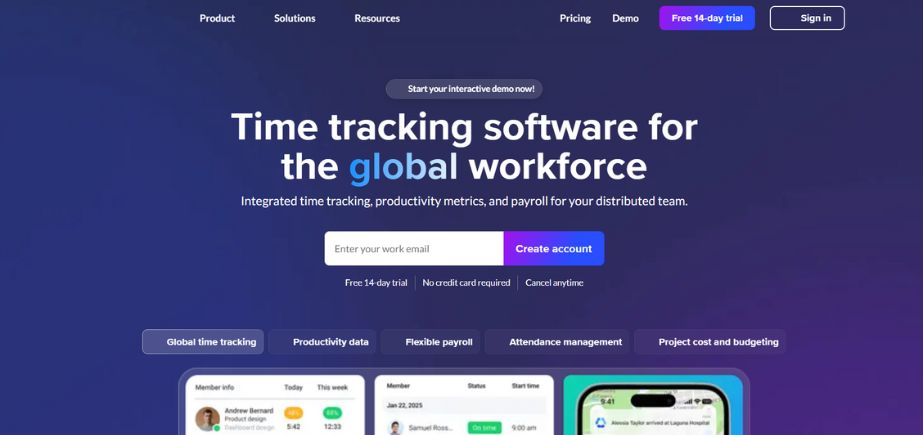
Rating: 4.5/5
Website: https://hubstaff.com/
Best Use Cases: Remote and distributed teams requiring comprehensive monitoring and productivity tracking
Hubstaff is a company that focuses on offering complete time tracking and productivity management tools to remote and dispersed teams. This platform integrates ordinary time tracking options and higher functionality, such as taking screenshots and monitoring activity levels, as well as application use tracking. Such a full-scale solution helps managers to keep an eye on the performance of distant groups and gives workers the means to learn more about their work behaviors and fix them.
The key advantage of Hubstaff is that, despite the high levels of transparency and accountability, it is not of a highly intrusive nature in remote workplaces. This platform uses GPS tracking to make it the best platform for field-based teams, and the productivity insights also assist organizations in optimizing the issues of remote work policies and practices. It is integrated with common project management and communication tools so that it fits in the workflow.
Key Features
- Automatic time tracking
- Productivity monitoring tools
- GPS location tracking
- Team scheduling features
- Payment processing integration
Pros
- Comprehensive monitoring capabilities
- Affordable pricing structure
- Strong mobile applications
Cons
- May feel intrusive
- Limited customization options
- Basic reporting features
Pricing: From $7/user/month (billed annually)
6. Accelo
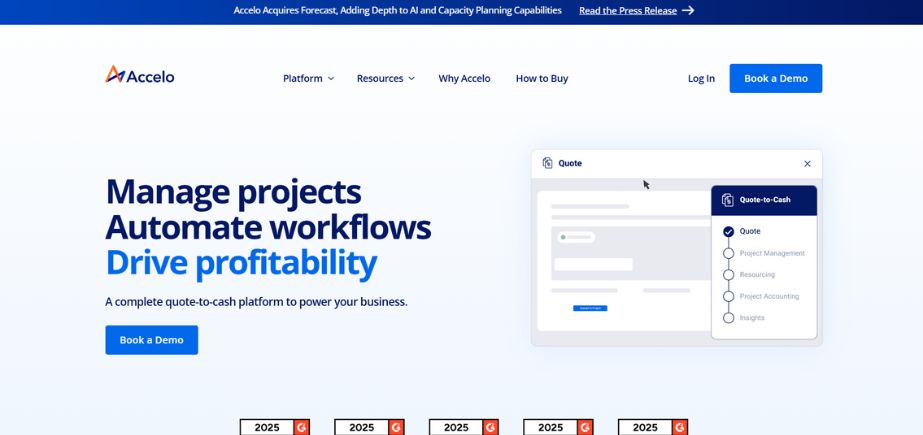
Rating: 4.4/5
Website: https://www.accelo.com/
Best Use Cases: Service businesses seeking integrated time tracking with comprehensive project management
Accelo offers a business management solution that gives project, time tracking and CRM, and billing capabilities in one integrated tool. The service-based businesses that have to cater to their client relations, monitor the process of their projects, and have to make sure that they are properly billing have a specific platform that is tailored to fit the needs of their complex workloads. Accelo is strong because it offers into view a complete view of the client lifecycle, starting with the first interaction to project delivery and billing.
The time tracking feature flows naturally into the project work, client interactions, and financial management of the system, so that we don’t miss any billing activity and assign it accurately. The integration also gets rid of information silos, wastes less administrative cost, and gives detailed information on business performance and client profitability.
Key Features
- Integrated CRM system
- Project management tools
- Automated billing processes
- Client communication tracking
- Business intelligence dashboard
Pros
- All-in-one business solution
- Strong integration capabilities
- Comprehensive client management
Cons
- Complex feature set
- Higher implementation cost
- Steep learning curve
Pricing: Available upon request
7. Insightful
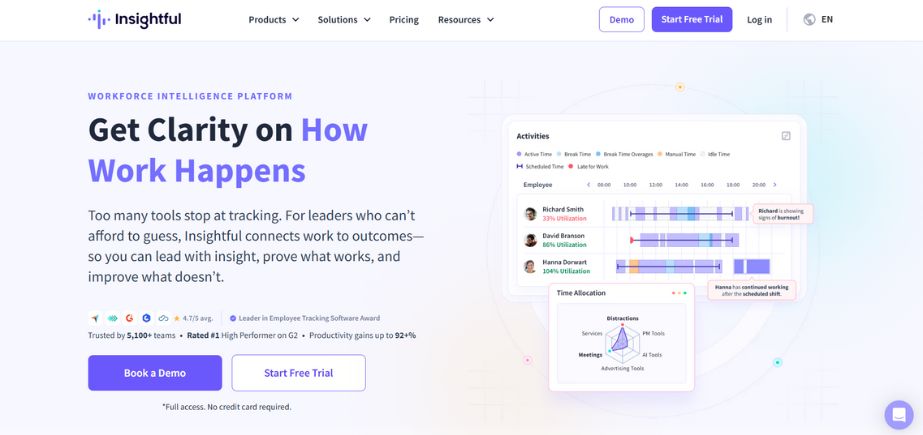
Rating: 4.3/5
Website: https://www.insightful.io/
Best Use Cases: Organizations requiring detailed remote workforce monitoring and productivity analytics
Insightful aims to help organizations offer overall workforce analytics and monitoring functionality targeting the remote and hybrid workplace. The developed platform is a mixture of time tracking and comprehensive productivity management, insights into how applications are used, and the behavior of people to enable organizations to research and optimize the effectiveness of remote work. The power of insight is in offering insight into the micro-level detail of how remote employees are spending their time, coupled with adding actionable intelligence to enhance productivity and engagement.
The advanced analytics offered in the platform assist managers in determining the patterns related to productivity, streamlining work schedules, and dealing with possible concerns in time before they affect the outcome of the project delivery. The availability of privacy settings and configurable monitoring ensures that an organization does not have to choose between the requirements of the oversight and employee privacy, as they can sustain a positive remote working culture.
Key Features
- Detailed productivity analytics
- Application usage monitoring
- Automated time categorization
- Team performance insights
- Privacy control settings
Pros
- Comprehensive monitoring features
- Strong analytics capabilities
- Privacy-focused approach
Cons
- May require an adjustment period
- Limited project management features
- Premium pricing for advanced features
Pricing: From $6.4/user/month
8. Deel
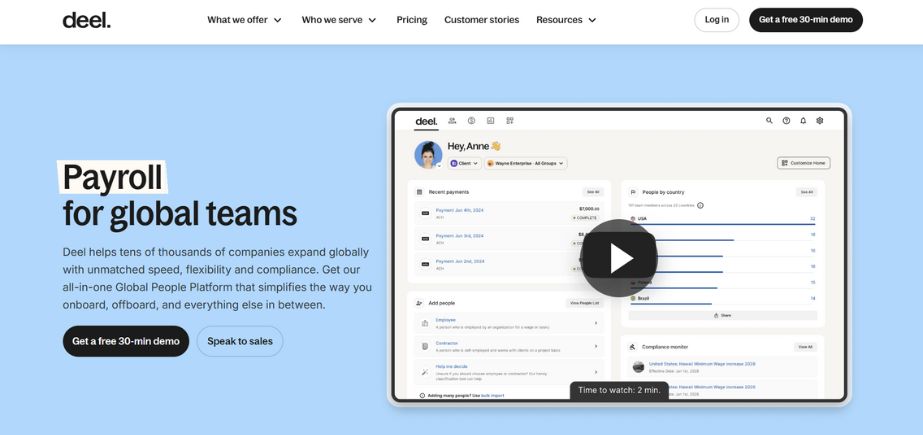
Rating: 4.2/5
Website: https://www.deel.com/
Best Use Cases: Global teams requiring integrated time tracking with international payroll management
Deel offers a complete workforce management solution to global teams that integrates time tracking with international payroll, compliance, and contractor management. The platform is built to solve the special technicalities surrounding the management of the distributed teams in different nations and in different currencies and regulatory environments. The advantage of Deel is that it can easily combine time tracking records and payroll transactions to provide proper compensation to both employees and contractors, irrespective of where they are.
The site manages complicated regulatory demands, taxation, and payment processing in different jurisdictions, and it has good time tracking and project abilities as project management functions that are transparent. This integration is especially useful to those organizations that have international workers or have operations in many countries.
Key Features
- Global payroll integration
- Compliance management tools
- Contractor payment processing
- Multi-currency support
- International tax handling
Pros
- Comprehensive global solution
- Strong compliance features
- Seamless payroll integration
Cons
- Limited time tracking features
- Higher cost structure
- Complex setup process
Pricing: From $29/month
9. Resource Guru
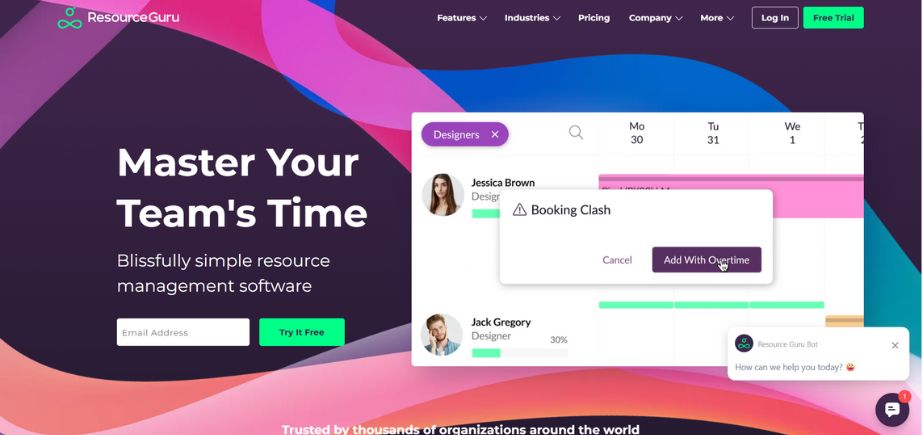
Rating: 4.1/5
Website: https://resourceguruapp.com/
Best Use Cases: Teams requiring simple timesheet logging and resource scheduling capabilities
The Resource Guru system offers a less complex yet, at the same time, no less effective way of timekeeping and resource control with emphasis on user-friendliness and straightforwardness. The platform provides an interface for easy timesheet logging integrated with graphical resource planning, where the teams can easily track their time and the managers can be able to know resource booking and availability. The main advantage of this application is its simple interface and simple scheme of time tracking that promotes the frequent use of Resource Guru by teams.
The visual scheduling feature of the platform assists in ensuring that managers are able to maximize the use of resources and also predetermine possible challenges that may occur before they affect project delivery. Collaborating with renowned project management and accounting applications guarantees the smooth flow of time data in business processes and quality assurance, combined with decreased administrative costs.
Key Features
- Visual resource scheduling
- Simple timesheet interface
- Team availability tracking
- Project time reporting
- Integration capabilities
Pros
- Intuitive user interface
- Affordable pricing structure
- Quick implementation process
Cons
- Limited advanced features
- Basic reporting capabilities
- Minimal automation options
Pricing: From $4.16/user/month (billed annually)
10. Ravetree
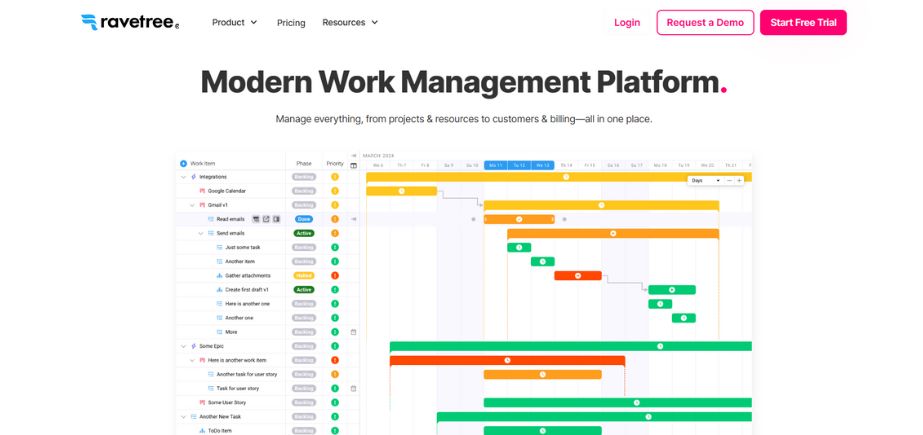
Rating: 4.0/5
Website: https://www.ravetree.com/
Best Use Cases: Teams needing integrated time and expense tracking with project management
Ravetree is a powerful project management solution that includes all the functionality related to time management, expense management, resource planning, and client collaboration. The platform is destined to be used as a comprehensive solution by project-driven business companies that lack the necessity of tracking their time and expenses, as well as to deal with rather intricate project processes. The advantage of Ravetree is that it gives the project complete visibility as far as the planning, execution, and charging of the project are concerned.
The built-in expense tracking functionality means that every project-related expense is recorded together with time information and gives proper analysis of the profitability of a project as well as good billing of the client. Its collaboration tools improve collaboration within a team and between a team and the client, and promote visibility in the progress of a project and resource usage throughout the project life cycle.
Key Features
- Integrated expense tracking
- Project management tools
- Client collaboration portal
- Resource planning features
- Financial reporting dashboard
Pros
- Comprehensive project solution
- Strong expense management
- Good client collaboration features
Cons
- Higher minimum user requirement
- Complex pricing structure
- Limited customization options
Pricing: From $29/user/month (billed annually, minimum 5 seats)
How to Maximize Your Output with the Best Time Tracking Software
This process involves the strategic implementation of the time tracking software that needs to be undertaken steadfastly to guarantee optimum improvement in productivity and efficiency within your organization.
- Integration: Smoothly integrate your time tracking application to support your other business programs to eliminate redundant data inputs.
- Training: Comprehensive training of the users and constant support are provided to make the team members familiar with the features and benefits of the tracking system.
- Automation: employ the functionality of automated tracking and smart grouping that will minimize manual input and loss of accuracy, and detailed information capture.
- Analysis: Periodically, check timekeeping reports and analytics to find trends in terms of productivity, bottlenecks, a nd the areas of possible process optimization improvements.
- Optimization: Keep track of methods, categories, and workflows updated continuously through use and feedback to enhance the adoption and efficiency of those processes.
How to Choose the Best Time Tracking Software
To get the best returns on your time tracking system of choice, it is only necessary to test it through a proper analysis of your organization’s necessary needs and limitations, as well as the goals your organization has in mind, bearing in mind the long run.
- Requirements: Conduct reasonable research on your current requirements of time tracking systems regarding the number of users, the complexity of projects to be tracked, billing requirements, and integration requirements. Focus on current and future projections so that the solution can grow with the company.
- Budget: Set definite budget parameters in terms of initial setup, recurring subscription charges, training, and possible customisations. Consider expenses like data migration, extra user licenses, and extra feature access as you compare various options.
- Scalability: Assess how well the software can scale with your organization, such as its number of users, whether it can extend its features, how well it performs when more users are under load, and whether it can be administered. Take into account the ability of the solution to adapt to a changing business model and transformation of operations over time.
- Support: Check on the nature as well as the availability of the customer support services, response, channels of support, document quality, and training. Development of products and customer satisfaction is the reputation of the vendor, since it is important that the partnership can last in the long run.
- Security: Look at data protection safeguards, compliance certifications, backup process, and controls to make sure time and project-sensitive data are secure. Review the security history of the vendor and how able they are able to handle your compliance standards within the industry successfully.
Conclusion
The market of time tracking solutions is still under development, given that it presents organisations with more and more advanced solutions to track, analyze, and optimise their most important asset: time. The finest time tracking software tools presented in this hodgepodge guide are the state of the art, and it is not a surprise to note that they all have exclusive capabilities and strengths that stand out, not to mention that their aptitude is meant to serve a particular organizational purpose and goal. A combination of automations of various tasks enabled by AI technologies, to integrations into business management capabilities, makes it possible to see how time tracking technology has developed massively, and therefore the responsibilities it could be involved in in the future of businesses.
Time tracking software implementation is not a process that can be achieved through a simple choice in tools; a proper implementation approach should take into consideration such aspects as organization culture and current workflows, as well as long-term business goals. The best deployments happen when organizations take the time to invest in the best training practices, create usage policies that are easily understood, and develop and continuously improve their processes using machine-derived insights and user-generated feedback. It is at that point when the best time tracking software will be really useful, when it is so simple to use, that it adds valuable insight, instead of causing extra administrative overhead.
Frequently Asked Questions
Q: Why is time tracking software important to the contemporary business?
A: Time tracking software offers important insights into the use of resources, allows proper billing for projects, ensures observance of labor laws, and supplies data-oriented information to enhance the productivity and profitability of all business activities.
Q: What are some ways I can make my team adopt time tracking software regularly?
A: The key to success is the selection of a user-friendly solution, offering extensive training with clear upside results, deploying automation whenever feasible, and phasing in reasonable policies that provide a balance of control and trust with employees.
Q: Is it possible to combine time tracking software with currently existing business systems?
A: The majority of contemporary solutions have a vast scope of integration features with most of the widely used project management, accounting, and payroll tools/systems, as well as CRM, so the data between these tools will flow freely, and there will be no need to duplicate data entry on the same tool level.
Q: What are the security aspects that I should consider when choosing time tracking software?
A: Basic security measures are data encryption, secure access controls, periodic security audits, security compliance certifications, a good backup system, as well as open policies on privacy that safeguard sensitive employee and project data.
Q: How much would it cost me to purchase time tracking software?
A: Depending on the features, the number of users as well as custom work a vendor might need to do, prices could range between 4-30+ dollars per user per month, with enterprise products sometimes being based on custom pricing due to the specific needs of the organization and the work that a vendor needs to do to be able to comply.






